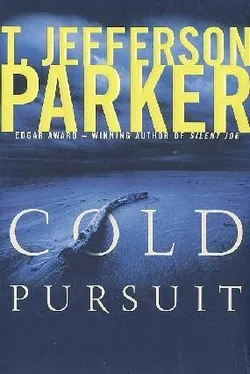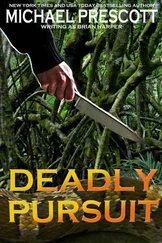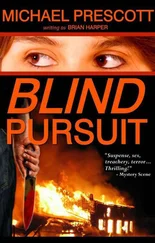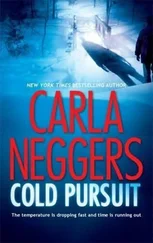
T. Jefferson Parker
Cold Pursuit
That night the wind came hard off the Pacific, an El Niño event that would blow three inches of rain onto the roofs of San Diego. It was the first big storm of the season, early January and overdue. Palm fronds lifted with a plastic hiss and slapped against the windows of McMichael's apartment. The digitized chirp of his phone sounded ridiculous against the steady wind outside.
"Somebody killed Pete Braga about an hour ago," said McMichael's lieutenant. "You're up on the wheel of fortune, but I'll give it to Team Two if you want."
It was a question McMichael could think about for a long time but didn't.
"We'll take it."
"Somebody bludgeoned Pete in his house, Tommy," said the lieutenant. "Blood and brains all over the place. Patrol's holding the cleaning lady or some such thing."
It took McMichael a moment to transfer Pete Braga from the roster of the living to the ranks of the dead. Murder was always a surprise. Especially if it was someone like Pete, who seemed like he'd live forever.
"We'll take it," he said again.
A brief pause. "You're sure about this, Tom?"
"I'm sure."
"The Irish are a stubborn people. About as stubborn as the Portuguese. Okay, then. Pete Braga's yours."
Eighty-something years old, thought McMichael. It wouldn't take a gladiator to crush the old man's skull. A local badass hero, done in by the cleaning lady.
"I'll make the calls, Tommy. You get moving. Need the address?"
"I know it."
Pete Braga's estate was on the bay side of Point Loma, right down on the water. Three levels of weathered redwood and plate glass descended to the sand. The glass caught the wind-fractured lights of Shelter Island and the city across the bay.
The driveway gate was open and McMichael could see three San Diego PD patrol cars, two slick-back Fords, a paramedic truck and a red Beetle parked in the sweeping brick drive. A small crowd had gathered at the crime scene tape that ran across the driveway. They looked like carolers between songs, McMichael thought, uncertain and self-conscious, coats and scarves and hair riled by the wind. He lowered a window and badged a uniform. The officer untied one end of the tape and it shot from his hand toward the water.
McMichael followed the walkway to the front door. The path was lined with bronze light fixtures shaped like leaping tuna. Behind the lights a stand of Norfolk Island pines swayed against a faint moon wrapped in clouds.
At the front door an officer T. Sterling handed McMichael an entry log. Before looking at it McMichael studied the outside doorknob, the jamb and frame.
"Shoot," he said, scanning down the log.
"We were first on scene, sir," said the officer. "Slow night, maybe because of the storm coming in. Then the watch commander dropped a possible one-eighty-seven on us. We got here in seven minutes. The nurse who made the nine-one-one call let us in. I noticed substantial amounts of blood on her hands, face and clothing. The old man was in his trophy room, or whatever you'd call it, by the fireplace. His head was caved in. The nurse was upset and not really cooperative, so Traynor took her into the dining room. I ran a warrants check on her and she came back clean."
McMichael signed the log and looked into T. Sterling's eager gray eyes.
"A nurse, not a cleaning lady."
"That's what she said."
McMichael gave the log back to Sterling. "The blood on her clothes, was it smears or spatters?"
"I'm not sure. Mostly smears, I believe."
"What about her face?"
"I think smears too."
"You didn't let her wash up, did you?"
"I don't think Traynor was going to."
Another officer led the detective to the scene. The trophy room was down a long hallway, then to the right. McMichael felt the coldness of the house in his shins. The hall was wide and well lit by recessed ceiling lights. There were paintings hung museum style, with individual viewing lights fastened above the frames: all ocean scenes- ships and waves in violent moments, the grandeur of catastrophe at sea. One light was trained on nothing, just blank wall with a hanger still nailed to the plaster.
He stepped down into the trophy room, smelling blood and feces and cigar smoke. Two small bundles of firewood lay at his feet. Above him was a cavernous cross-beam ceiling with heavy-duty shop lamps hung in two rows of six. The lamps washed the room in a strong incandescent glow.
McMichael pulled the little tape recorder from the pocket of his bomber's jacket, checked the tape and turned it on. He spoke into it, setting the time and date and location, then narrating what he saw.
Ahead of him was a wall of glass facing the water and the city. Beyond the glass, windblown leaves swirled through the deck lights and a quick blizzard of sand rose toward San Diego Bay. A navy destroyer sat moored to the east, irrationally large amidst the tenders and pleasure craft.
To McMichael's right was a cedar-paneled wall festooned with Pacific trophy fish- tuna, yellowtail, dorado, swordfish, sailfish and sharks. In the lower right corner of the wall hung some of the gear used to catch them- rods, reels, gaffs and fighting belts.
His eye went to the two empty hangers, like he'd seen in the hallway. One amidst the fish, one in the gear.
The main attraction was a white shark that looked to be three times the length of a man. It was obscenely thick. Rows of teeth glistening, its huge head swung outward in the posture of attack. McMichael noted that the taxidermist had gotten the eyes right, rolled back into the head for protection. He remembered that Pete Braga had made TV and the papers with that one.
To his left was a large fireplace with no fire and two handsome leather chairs facing it. On either side of the hearth stood enormous saltwater aquariums teeming with tropical fish. McMichael stepped past the bundled firewood. Between the chairs was a small table and a lamp with two shades, two bulbs and two brass pull chains. Both bulbs were on. Two half-filled glasses of what looked like red wine sat on the table.
He walked over and looked down on the body of Pete Braga, slouched almost out of the right-hand chair. Braga was wearing a smoke-gray satin robe. He had slid down, legs buckling on the floor, his back and head flat on the chair seat. His arms dangled over the rests, hands relaxed. His head was bathed in blood and the top crushed in the middle- skin and hair and bone seeming to fall in upon themselves. His face was a bloody mask of surprise and confusion, eyes open and still reflecting light. On the hardwood floor to the left of the chair stood a pond of blood littered with pale debris and a short club with a leather loop at the end of the handle. McMichael felt the hair on his neck stand up.
Requiescat in pace , he thought, thirty-plus years of Catholic funeral Latin imprinted in his mind. What a way to get your last ticket punched.
He remembered Braga as a tuna fleet captain, way back in '70. McMichael had been five years old. He remembered him as a Ford and Lincoln Mercury dealer a few years after the tuna industry collapsed- Pete's robust, gray-haired face smiling down at you from freeway billboards on the 5 and the 8, and the 163 and along Clairemont Mesa Boulevard. Remembered him as a mayor and a port commissioner and a city booster, always tossing out the first pitch at a Padres game, smiling while a champagne bottle cracked against a hull, touring the latest opening or disaster.
But easiest of all McMichael remembered Pete as the grandfather of Patricia Braga, the first girl he'd fallen in love with. They were children then, back before they fully understood that the McMichaels and Bragas had spilled each other's blood and that they were supposed to hate each other.
Читать дальше













